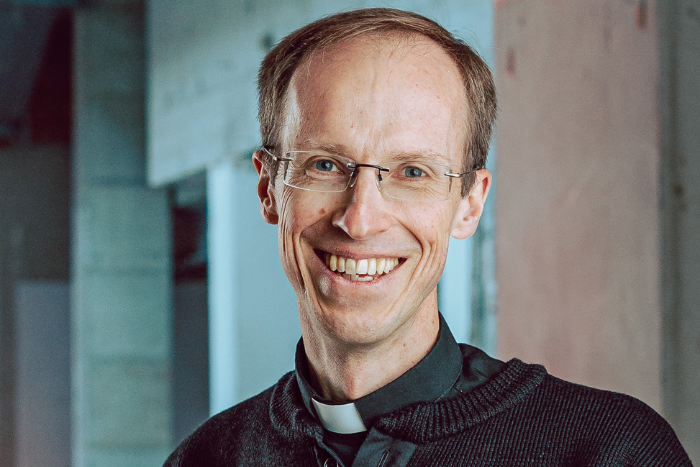How does hope work? And what does the Christian mean when he talks about hope? And how can he continue speaking about it when there are so many things in our lives and in the world around us that are nothing but hopeless? And what can we expect? Father George Elsbett L.C., director of the John Paul II Center in Vienna, offers some answers given in his early-year sermon, published on the official website of the Legionaries of Christ in the Western and Central Europe Territory.
Read the original article on the Western and Central Europe Territory website
I will try to answer the questions in two main steps. The first step is to better understand what we mean when we talk about Christian hope and why it may be particularly difficult for us, modern people. In a second step, I would like to reflect on how we can grow in hope, using four suggestions I extracted from today’s readings (1 John 2:18-21; John 1:1-18).
First, the question: What does the Christian understand by “hope” and why might it be particularly difficult for us?
Over the past year, I have come to greatly appreciate Alfred Delp. Delp was a Jesuit. He worked 2.5 kilometers from here (Munich), at the Heilig Blut Parish in Bogenhausen. He was executed by the Nazis on February 2, 1945. In one of his writings, the following phrase appears: “Revelation does not come from outside. It is in people. To find oneself finding God, and to find God by finding oneself, that is the idea developed in religion. The abysses’ wells open in your own heart. Everything is a growth from within, striving toward perfection.”
But the quote is not his. Delp quotes a passage from the Nazi-influenced monthly magazine “Deutscher Glaube”. I wanted to highlight the abyssal gap between the previous quote and the Christian faith. But I don’t know how many Christians today would nod in agreement upon hearing this quote instead of recognizing the depths of a neopagan religion. “ Find yourself. All the potential is already within you, you just have to discover it. Believe in yourself and everything will be possible for you. Become the best version of yourself. Realize yourself and your potential.” I always get a little shiver when I hear words like these, especially when they come from a Christian’s mouth. And when we use phrases like “We want to help people become the best version of themselves” in Regnum Christi, it’s important to understand this very well in its reference to God so as not to fall into a self-redemptive and atheistic spirituality.
One could propose the thesis that the religion that has largely replaced Christian faith in the Western world today is called “Gnosis”. It is a primitive Christian heresy that appears again and again throughout history under different names. The Nazi quote we just mentioned also has strong Gnostic tendencies. Gnosis is like an opponent of Christian hope. Attractive to many. But it promises something it cannot fulfill. And I want to emphasize here that a purification of our hope is necessary to ensure that we hope in a Christian, not Gnostic, way.

Father George Elsbett L.C., director of the John Paul II Center in Vienna
“The final hour is here.” There will be a final hour. The Christian thinks linearly. There was a beginning, there will be an end for this world, including my world when I die. We are heading toward a goal, toward a final hour, which then opens eternity for us.
Many pagan religions, on the other hand, believe that time is cyclical, the always recurring nature of things like in Egypt, some of which have produced very stable social systems. It’s about accepting what returns.
This assumption does not exist among Christians. The Christian would say that there is a fundamental problem in the world. The breaking of the world, the fundamental evil, has its roots in the human heart and is called sin and abuse of freedom. The true cause of all evil is the rejection of divine order, the saying no to God. The light came into the world. But people loved darkness more than light. The world was born through Him, but His own did not receive Him. But to all who received Him, He gave the power to become children of God. So we do not live in paradise, but we are heading toward it.
The Gnostic also thinks linearly. Unlike many pagan religions, Gnosis also sees that there is a problem in the world. Gnosticism is not willing to simply accept the problems. That’s what makes it so attractive. But it seeks a solution to the problem in the inner world, through the application of knowledge and techniques. The Gnostic would deny that we are in a final hour; he sees no decisive moment for the departure toward a new world redeemed by God. Paradise does not exist in the hereafter, but we build it here. People, and hopefully also us Christians, have always tried to solve problems by applying knowledge. That’s very good. The difference lies in the Gnostics’ claim to be absolute and capable of solving all problems. Sociology solves our social problems. Psychology the problems of the inner man. Politics the problems of interpersonal life.
Gnosticism is essentially a denial of the fall of man. It is a denial of sin, of abuse of freedom. And that’s why the causes of problems are not sought in the heart itself, but outside, or in the application of certain practices, in overcoming and dismantling unhealthy structures, etc., but certainly not in personal conversion. For Gnosticism, there is no intrinsic limit to human progress. Even the problem of death could be solved through transhumanism.
This is the temptation of the serpent: you will be like God. It is the pride that paradoxically leads to discouragement and loss of hope. The Christian who thinks Gnostic, for example, would not deny heaven. But this belief has little practical impact on his daily life. All his efforts are focused on this world. And it can be very discouraging for him when his paradise does not become a reality, when things don’t turn out as he thought, when he doesn’t find the partner or the job of his dreams, when faced with illness, loss, scandal, or insufficiency.
The Christian who thinks Gnostic has utopian tendencies. My partner must fulfill all my desires. How bad I must be if others are not as I imagine they are. How bad I am if my Regnum Christi team is doing so badly after a year. If after five years, the prayer life remains so dry, if I still have such strange temptations. Forget that Jesus promised tribulations and that resurrection cannot happen on Good Friday. Lose sight that the conversion of the heart takes time, it does not simply happen through applying techniques and therapies (nothing against therapies) and will only be completed in heaven.
The “Christian Gnostic” divides people into good and bad. And gets frustrated when the good are not always so good and seeks a new group of the good. Because the problem is not himself and his heart, but external structures and power imbalances, he tends to build the kingdom of God with worldly means. And he gets disappointed when it bears little fruit… he just needs to find a better structure, a new time management tool, simply work harder in prayer — and everything will be fine.
Perhaps one of the most evident examples of how Gnostic infiltration weakens or destroys hope is the attitude of man towards himself and towards God. Here is a slightly paraphrased thought from Monsignor James P. Shea in his book “The Religion of the Day”:
“When we think of a proud person, most of us see an arrogant person, full of himself, who despises others. But most modern people do not feel proud in this way. Most people today tend to lack a strong sense of identity. You are far from overestimating yourself and find it hard to see yourself as as good as others. As a result, we are attracted to external and often superficial sources of identity that reinforce our lack of confidence in ourselves. In our fragility, we are easily hurt by others’ negative opinions and obsess over not hurting anyone… But all this seems to indicate not pride, but excessive humility.”
However, at the same time, we swim in a cultural sea of Promethean resistance to everything divine. Our world assumes that each individual is responsible for ordering their existence, choosing a morality, and deciding the meaning of life… and we have little sense of a cosmic order to which we must adhere if we do good and want to find happiness. Statements like “You can be whatever you want” or “Your life belongs to you and no one else” are deeply illusory, but so common that they are considered uncontroversial.
This places all of us in a uniquely historical situation. Modern humans suffer a kind of visionary schizophrenia. In our self-perception, we are among the most fragile and insecure people in history, while in our attitude toward everything divine, we are among the most arrogant the world has ever known.”
This strange combination points to a central challenge for Christians of our time and for us in Regnum Christi: How can we, on the one hand, awaken generosity, courage, confidence, and high ideals and, on the other, find the way back? To a humble and therefore true attitude toward God?
Read the original article on the Western and Central Europe Territory website
The answer, I believe, has to do with Christian hope. Which is not a utopia, but the illumination of God’s work in this world and our participation in it.
What can we expect? “God! God!” said the Christian and the community with him. Participate in the security of the eternal Son in the bosom of the eternal Father. Everything else is not enough. It points too low. Faded. Fails. Empty pages. Frustrated. “In the beginning was the Word.” (John 1:1) So in the beginning there was no chaos. I and this world are not the product of chance. My life is not a composition of arbitrary things. I and this world have a meaning and a goal. Everything, including me, emerged through this word; it gave me the power to become a child of God. Christian hope is not about my plan for my life, but about His plan for my life. God is the goal of my hope to give me everything I need to live in communion with Him for all eternity. This is also God’s highest goal for me.
At the beginning of this sermon, we asked ourselves what Christian hope is about and realized that perhaps one of the reasons why it is so difficult for us today is because we do not hope in a Christian way, but Gnostic. Here, at the end of the second step, I want to point out four doors that can open the way to hope:
1. Prayer. When I realize how difficult it is for me, it helps me to become aware of His presence and to start a conversation with Him as quickly as possible. It particularly helps me to come to Jesus personally in the Eucharist. That is not always the solution, but I notice how it calms me and gives me a new sense of security. For example, when something I thought had to happen did not happen. Teach me to make your words my own on the cross: “Why have you forsaken me?”… and yet, at the same time, to cry out with you: “Father, into your hands I commend my spirit.”
2. Community. “Church” remains largely a phrase in which one does not commit to a specific group of people. The Christian community is not something “nice to have,” nor a purely practical consideration because we are social creatures. No! Communion is a commandment of the Lord and a prophetic sign of hope that points to the communion of saints in heaven.
In today’s first reading, John speaks of the tendency of the Antichrist to abandon the community. That is understandable. The Gnostic tendency is precisely to divide the world into good and evil. It forgets that the dividing line between good and evil is in one’s own heart. It wants to survive in the elite club, rather than in the community of imperfect people. As soon as things get difficult, you leave. And that’s why you feel lonely, others become the cause of your own problems. The community is a school of hope where we do not give up on each other or on God. Today, we find an invitation in “Bearing Witness to the Light”: sharing with one another how the Lord has worked in your lives can be a powerful encouragement of hope.
3. Cling to the truth. Always! “I write to you not because you do not know the truth, but because you know it,” said the first reading. The willingness to face the truth, even when it is hard, strengthens hope. Why? Because hope is based on the decision to entrust oneself to God. It is the decision that the world was ultimately created by God to be good, even if it is wounded. Lies are always an escape, an inability to trust that if I submit to the order established by God, it is truly good and will bring good things. What is the consequence of lying? It is the practical denial of the belief that the world was created as good. And with that, the affirmation that the world is not good. So all I have left is despair and cynicism, and I build my own little hell, and everyone else and everything else, including God, are the culprits of my problems. Adhering to the truth also means recognizing the truth:
For example, if I fell two minutes after my last confession… yes, I am a sinner. I am not perfect. But I do not waste a second on useless lamentations about the past. I believe that You, Lord, can and want to sanctify me, that there are no impossible situations for You, but always a future. Declaring God’s truth about me, for example in the morning in front of the mirror: I am His beloved daughter, His beloved son. And to abandon lies: I will never achieve anything, I am not worthy of being loved, I am not good enough, etc. This is good for us and is an exercise of hope.
4. Sing and encourage… We encourage when we run out of words… singing anyway, even when we don’t feel like it, is an act of hope, of trust. Similar to how Silas and Paul in prison decide in the middle of the night to sing songs of praise instead of dying of fear. Personally, I find great strength in singing the Psalms, only when I do not bother anyone… today’s Psalm interlude is: ” Let the fields rejoice and everything in them ” (Psalm 96:12). When I do, I feel that nothing grows in me, that my prayers are super dry… then the Psalms lift my spirit.
Let’s summarize:
“Revelation does not come from outside. It is within people.” Believe in yourself and you can achieve anything! …No, I would say the Christian, that’s the best way to despair!
The source of our hope is not ourselves. It is HIM, the Lord! We face this task of bearing witness to the hope that can only be found in Him. And at the same time, we want to shout to this world: Don’t think so little of yourself!










